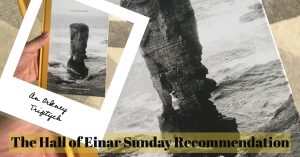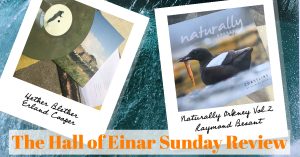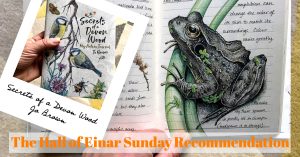The Hall of Einar Sunday Review #15
Hello and welcome to my Sunday Review. Every week I read great wildlife and nature books, see engrossing websites and hear wonderful new music – this is my chance to bring you all the best I’ve experienced – every Sunday.
If it’s folk, or independent, or about wildlife, nature or Orkney I may love it, and so may you.
Faraway People – Reg Meuross
What English folk songs do you know? It’s a serious question. Ask the question ‘What Scottish folk songs do you know?’ to a person from Scotland and they’ll rattle off a few traditional or folk songs in no time, including a verse and a chorus from Scotland The Brave or Flower of Scotland. Someone’s sure to say Caledonia or Wild Mountain Thyme. Ask in Ireland and you’ll be amazed how many young people know all the words and the dances. In England? In the street? How many people would be able to even name one traditional folk song. You might get a Jerusalem from a rugby fan, with a bit of Swing Low Sweet Chariot. Anything else? Blaydon Races anyone?
I check YouTube and the best English folk songs are, apparently:
All in a Garden Green, The Earl of Essex Galliard, Windsor Terrace, Kemp’s Jig, Deo Gratias, Lord Willoughby, Putney Ferry, Corranto, Farewell to Happy Llangyfelac, Alman, Dick’s Maggot, Three Ravens, Robin, The Miller’s Dante and Corranto.
I’ve got to say that Happy Llangyfelac doesn’t sound too English to me. Apart from Three Ravens I’ve never heard of them. Ask a hundred English people for a verse of The Derby Ram or The Raggle Taggle Gypsy? I expect you’ll get silence.
How did this happen to English people? What cultural purge was there which made English people forget their songs, their stories, their traditions? How do we know who we are and what we share if we can’t even share a song? What would English people call for as a final song before their night-time journey home? Rule Britannia? God Save the Queen? Vile colonialist dirges, both. How did folk music become seen as a laughing stock of extremists, purists, long-beard wearing, real ale drinking, socks and sandals wearing eccentrics?
As well as ignoring English musical heritage, English people are ignoring their present. The most important writer of contemporary folk songs about ordinary people’s experience in England today is Reg Meuross. Here’s Faraway People:
The sleeve notes say: “The names in this song are real. These are just a few of the great number of people who have died in Britain as a direct result of government cuts to their incapacity benefit, or because of the bedroom tax.”
The album Faraway People by Reg Meuross is a masterpiece. Every song is thoughtful, empathetic or full of controlled anger. I shouldn’t have to say that Reg Meuross has a social conscience because, shouldn’t everyone? Each song is beautifully and simply presented.
Here’s Refugee:
If you’ve not discovered Reg Meuross yet then now is the time. Here’s a link to his shop. You’ll wonder where he’s been all your life.
Matt Sewell’s birds
A quick visit to The Longship in Kirkwall gave us a chance to see this glorious wooden postcard of a Puffin by Matt Sewell, made by The Wooden Postcard Company. It’s beautifully made, nicely finished and amusingly designed.

They have a full range of Matt Sewell‘s birds printed to order in the Wooden Postcard Company shop. Great for a gift. I’ve just spoilt the surprise for all of my friends by revealing how great they are, haven’t I? Matt Sewell is a serious ornithologist as well as an artist so his work is closely and accurately observed as well as amusingly portrayed. They are well worth investigating and really too good to send.
That’s it for this week. I’ll be back with more reviews of things you might adore next Sunday.
In the meantime, I wish you a great week. Keep safe, everyone.
More Sunday Reviews
 The Hall of Einar Sunday Recommendation #23 An Orkney Triptych - Book One by Erland Cooper and Alex Kozobolis read more
The Hall of Einar Sunday Recommendation #23 An Orkney Triptych - Book One by Erland Cooper and Alex Kozobolis read more The Hall of Einar Sunday Review #20 Hether Blether by Erland Cooper and Naturally Orkney Vol.2 - Raymond Besant read more
The Hall of Einar Sunday Review #20 Hether Blether by Erland Cooper and Naturally Orkney Vol.2 - Raymond Besant read more The Hall of Einar Sunday Review #19 Feather by Edgelarks and Pony Congo by Vicente Paredes. read more
The Hall of Einar Sunday Review #19 Feather by Edgelarks and Pony Congo by Vicente Paredes. read more The Hall of Einar Sunday Review #17 In The Dreamtime by Nicki Gwynn-Jones and Live at the Old Fruitmarket by Rura read more
The Hall of Einar Sunday Review #17 In The Dreamtime by Nicki Gwynn-Jones and Live at the Old Fruitmarket by Rura read more The Hall of Einar Sunday Review #16 Fungi – card game by Brent Povis and Collins British Mushrooms & Toadstools photographic guide read more
The Hall of Einar Sunday Review #16 Fungi – card game by Brent Povis and Collins British Mushrooms & Toadstools photographic guide read more The Hall of Einar Sunday Review #14 Hello and welcome to my Sunday Review. Every week I read great wildlife and nature books, see engrossing websites and… read more
The Hall of Einar Sunday Review #14 Hello and welcome to my Sunday Review. Every week I read great wildlife and nature books, see engrossing websites and… read more

